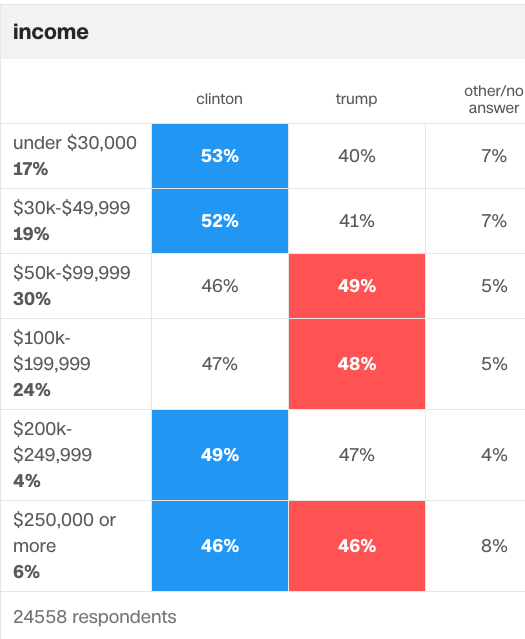About those “downtrodden voters”
Right now our best and brightest pundits are trying to make us believe lots of things that just aren’t true:
1. That fiscal stimulus can work while the Fed is raising i-rates.
2. That trade deficits cost jobs.
3. That manufacturing has been hit by trade, not automation.
4. That monetary policy is ineffective.
Another another phony theme is that Trump won because he appealed to the “downtrodden voters”, which coastal elites like me don’t understand. That’s nonsense:
As you can see it’s exactly the opposite, both the low income and the lower middle income voters went strongly for Clinton, while the middle class tilted slightly to Trump
So why do our pundits keep lying to us? They have an agenda to massively increase the size and scope of government, and want to use this election to discredit free market economics, which supposedly favors the rich.
So how do the pundits keep lying to us? They start by singling out low income white voters, who did indeed opt for Trump (AFAIK). Then they simply assume that black lives don’t matter, Asian lives don’t matter, and Hispanic lives don’t matter. Low income whites are the only low income people who matter. Hence in their view it’s perfectly accurate to say that Trump represents America’s downtrodden voters, even though it’s technically a lie. It’s true in spirit (in their warped minds).
There’s a certain type of commenter who talks a lot about struggling low income whites, but couldn’t care less about low income minorities. When they mention the minorities at all, it’s just to point out how “lazy” they are. In contrast, the low income whites are not lazy, rather they are “victims of the neoliberal system”. When leftists used to argue that minorities were the victims of the system, these very same born again populists would roll their eyes in disbelief. Let’s call them “SJWWs”, social justice white warriors.
Now let’s all watch Trump abolish the 45% estate tax on his $10 billion estate. His way of helping the downtrodden.
PS. The exit polls are interesting. It seems that 47% of voters didn’t think Hillary was qualified to be President, and 61% of voters felt Trump was unqualified. I felt that Hillary was qualified, but Trump was not. I still feel that way. On the other hand, I don’t agree with Hillary on lots of issues.
The most amusing factoid was that 2% of voters had a favorable opinion of both Trump and Clinton. That’s about 2.72 million Americans. I think it would be kind of interesting to attend a cocktail party with about 120 of those people, get a sense of how they look at life. I’m pretty sure they are not leaving comments after my blog posts.




